Timotheus Kampik
Specification, Application, and Operationalization of a Metamodel of Fairness
Nov 14, 2025Abstract:This paper presents the AR fairness metamodel, aimed at formally representing, analyzing, and comparing fairness scenarios. The metamodel provides an abstract representation of fairness, enabling the formal definition of fairness notions. We instantiate the metamodel through several examples, with a particular focus on comparing the notions of equity and equality. We use the Tiles framework, which offers modular components that can be interconnected to represent various definitions of fairness. Its primary objective is to support the operationalization of AR-based fairness definitions in a range of scenarios, providing a robust method for defining, comparing, and evaluating fairness. Tiles has an open-source implementation for fairness modeling and evaluation.
Set Contribution Functions for Quantitative Bipolar Argumentation and their Principles
Sep 18, 2025Abstract:We present functions that quantify the contribution of a set of arguments in quantitative bipolar argumentation graphs to (the final strength of) an argument of interest, a so-called topic. Our set contribution functions are generalizations of existing functions that quantify the contribution of a single contributing argument to a topic. Accordingly, we generalize existing contribution function principles for set contribution functions and provide a corresponding principle-based analysis. We introduce new principles specific to set-based functions that focus on properties pertaining to the interaction of arguments within a set. Finally, we sketch how the principles play out across different set contribution functions given a recommendation system application scenario.
Conversational Process Model Redesign
May 08, 2025
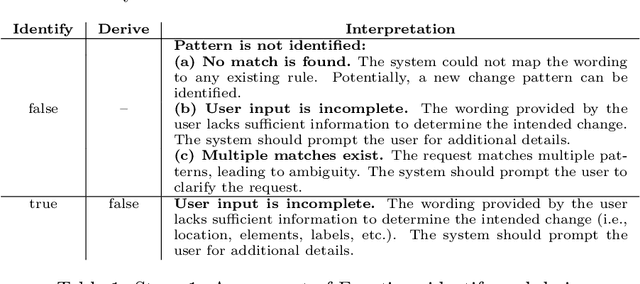
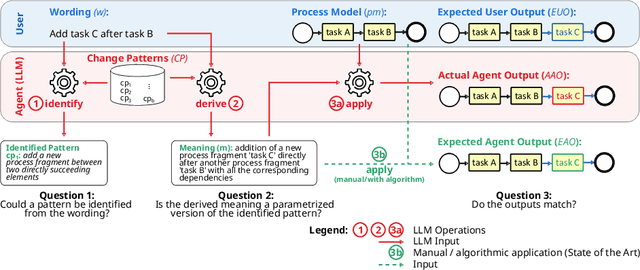

Abstract:With the recent success of large language models (LLMs), the idea of AI-augmented Business Process Management systems is becoming more feasible. One of their essential characteristics is the ability to be conversationally actionable, allowing humans to interact with the LLM effectively to perform crucial process life cycle tasks such as process model design and redesign. However, most current research focuses on single-prompt execution and evaluation of results, rather than on continuous interaction between the user and the LLM. In this work, we aim to explore the feasibility of using LLMs to empower domain experts in the creation and redesign of process models in an iterative and effective way. The proposed conversational process model redesign (CPD) approach receives as input a process model and a redesign request by the user in natural language. Instead of just letting the LLM make changes, the LLM is employed to (a) identify process change patterns from literature, (b) re-phrase the change request to be aligned with an expected wording for the identified pattern (i.e., the meaning), and then to (c) apply the meaning of the change to the process model. This multi-step approach allows for explainable and reproducible changes. In order to ensure the feasibility of the CPD approach, and to find out how well the patterns from literature can be handled by the LLM, we performed an extensive evaluation. The results show that some patterns are hard to understand by LLMs and by users. Within the scope of the study, we demonstrated that users need support to describe the changes clearly. Overall the evaluation shows that the LLMs can handle most changes well according to a set of completeness and correctness criteria.
Can Proof Assistants Verify Multi-Agent Systems?
Mar 10, 2025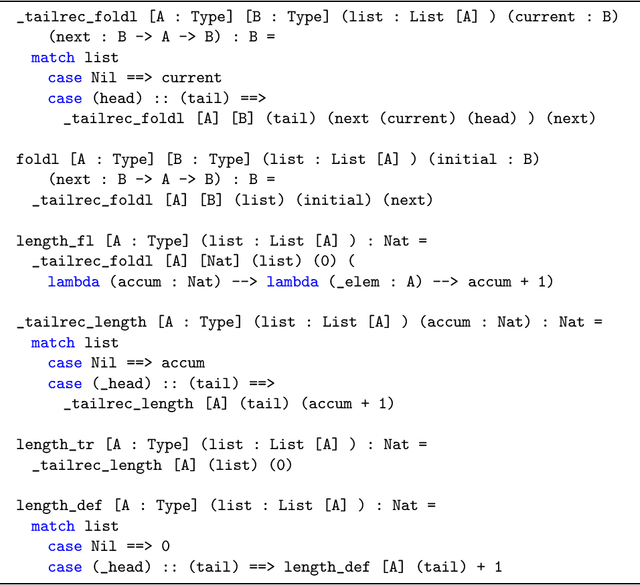

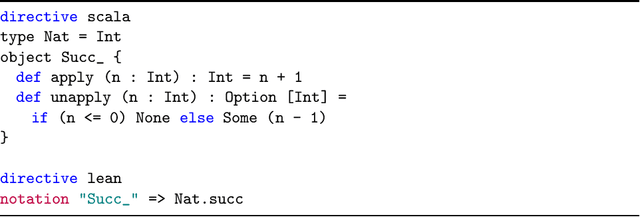

Abstract:This paper presents the Soda language for verifying multi-agent systems. Soda is a high-level functional and object-oriented language that supports the compilation of its code not only to Scala, a strongly statically typed high-level programming language, but also to Lean, a proof assistant and programming language. Given these capabilities, Soda can implement multi-agent systems, or parts thereof, that can then be integrated into a mainstream software ecosystem on the one hand and formally verified with state-of-the-art tools on the other hand. We provide a brief and informal introduction to Soda and the aforementioned interoperability capabilities, as well as a simple demonstration of how interaction protocols can be designed and verified with Soda. In the course of the demonstration, we highlight challenges with respect to real-world applicability.
Disagree and Commit: Degrees of Argumentation-based Agreements
Dec 31, 2024



Abstract:In cooperative human decision-making, agreements are often not total; a partial degree of agreement is sufficient to commit to a decision and move on, as long as one is somewhat confident that the involved parties are likely to stand by their commitment in the future, given no drastic unexpected changes. In this paper, we introduce the notion of agreement scenarios that allow artificial autonomous agents to reach such agreements, using formal models of argumentation, in particular abstract argumentation and value-based argumentation. We introduce the notions of degrees of satisfaction and (minimum, mean, and median) agreement, as well as a measure of the impact a value in a value-based argumentation framework has on these notions. We then analyze how degrees of agreement are affected when agreement scenarios are expanded with new information, to shed light on the reliability of partial agreements in dynamic scenarios. An implementation of the introduced concepts is provided as part of an argumentation-based reasoning software library.
AgentSimulator: An Agent-based Approach for Data-driven Business Process Simulation
Aug 16, 2024



Abstract:Business process simulation (BPS) is a versatile technique for estimating process performance across various scenarios. Traditionally, BPS approaches employ a control-flow-first perspective by enriching a process model with simulation parameters. Although such approaches can mimic the behavior of centrally orchestrated processes, such as those supported by workflow systems, current control-flow-first approaches cannot faithfully capture the dynamics of real-world processes that involve distinct resource behavior and decentralized decision-making. Recognizing this issue, this paper introduces AgentSimulator, a resource-first BPS approach that discovers a multi-agent system from an event log, modeling distinct resource behaviors and interaction patterns to simulate the underlying process. Our experiments show that AgentSimulator achieves state-of-the-art simulation accuracy with significantly lower computation times than existing approaches while providing high interpretability and adaptability to different types of process-execution scenarios.
xSemAD: Explainable Semantic Anomaly Detection in Event Logs Using Sequence-to-Sequence Models
Jun 28, 2024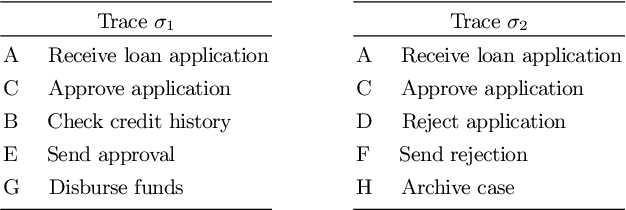
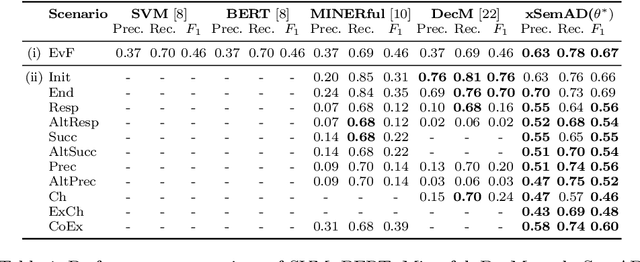
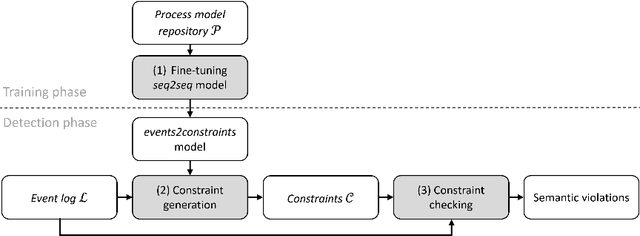
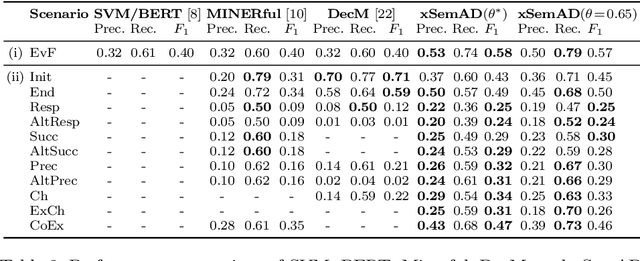
Abstract:The identification of undesirable behavior in event logs is an important aspect of process mining that is often addressed by anomaly detection methods. Traditional anomaly detection methods tend to focus on statistically rare behavior and neglect the subtle difference between rarity and undesirability. The introduction of semantic anomaly detection has opened a promising avenue by identifying semantically deviant behavior. This work addresses a gap in semantic anomaly detection, which typically indicates the occurrence of an anomaly without explaining the nature of the anomaly. We propose xSemAD, an approach that uses a sequence-to-sequence model to go beyond pure identification and provides extended explanations. In essence, our approach learns constraints from a given process model repository and then checks whether these constraints hold in the considered event log. This approach not only helps understand the specifics of the undesired behavior, but also facilitates targeted corrective actions. Our experiments demonstrate that our approach outperforms existing state-of-the-art semantic anomaly detection methods.
Contribution Functions for Quantitative Bipolar Argumentation Graphs: A Principle-based Analysis
Jan 16, 2024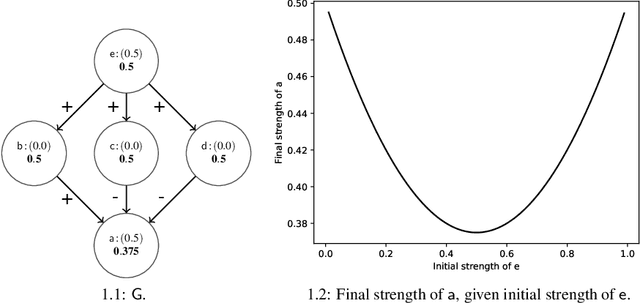
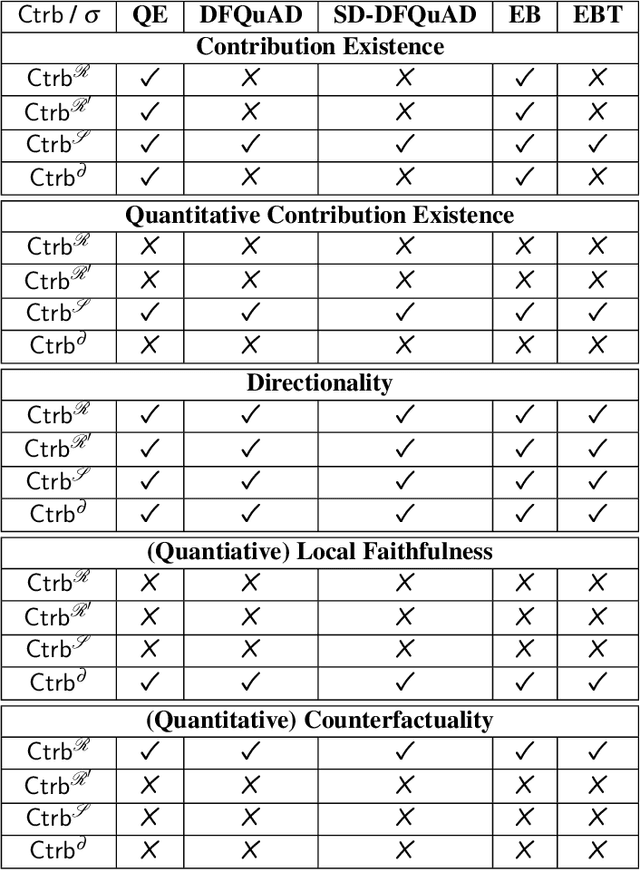

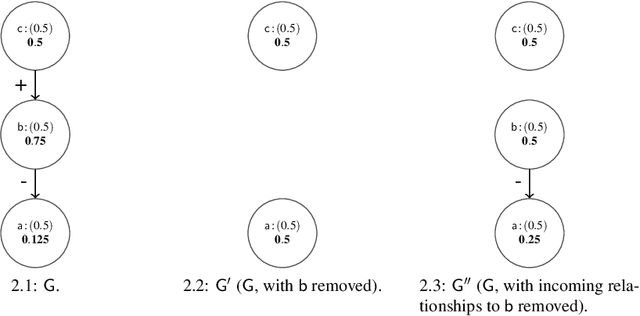
Abstract:We present a principle-based analysis of contribution functions for quantitative bipolar argumentation graphs that quantify the contribution of one argument to another. The introduced principles formalise the intuitions underlying different contribution functions as well as expectations one would have regarding the behaviour of contribution functions in general. As none of the covered contribution functions satisfies all principles, our analysis can serve as a tool that enables the selection of the most suitable function based on the requirements of a given use case.
Timeline-based Process Discovery
Dec 21, 2023Abstract:A key concern of automatic process discovery is to provide insights into performance aspects of business processes. Waiting times are of particular importance in this context. For that reason, it is surprising that current techniques for automatic process discovery generate directly-follows graphs and comparable process models, but often miss the opportunity to explicitly represent the time axis. In this paper, we present an approach for automatically constructing process models that explicitly align with a time axis. We exemplify our approach for directly-follows graphs. Our evaluation using two BPIC datasets and a proprietary dataset highlight the benefits of this representation in comparison to standard layout techniques.
Large Process Models: Business Process Management in the Age of Generative AI
Sep 11, 2023
Abstract:The continued success of Large Language Models (LLMs) and other generative artificial intelligence approaches highlights the advantages that large information corpora can have over rigidly defined symbolic models, but also serves as a proof-point of the challenges that purely statistics-based approaches have in terms of safety and trustworthiness. As a framework for contextualizing the potential, as well as the limitations of LLMs and other foundation model-based technologies, we propose the concept of a Large Process Model (LPM) that combines the correlation power of LLMs with the analytical precision and reliability of knowledge-based systems and automated reasoning approaches. LPMs are envisioned to directly utilize the wealth of process management experience that experts have accumulated, as well as process performance data of organizations with diverse characteristics, e.g., regarding size, region, or industry. In this vision, the proposed LPM would allow organizations to receive context-specific (tailored) process and other business models, analytical deep-dives, and improvement recommendations. As such, they would allow to substantially decrease the time and effort required for business transformation, while also allowing for deeper, more impactful, and more actionable insights than previously possible. We argue that implementing an LPM is feasible, but also highlight limitations and research challenges that need to be solved to implement particular aspects of the LPM vision.
 Add to Chrome
Add to Chrome Add to Firefox
Add to Firefox Add to Edge
Add to Edge